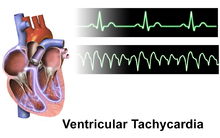- Home
- Editorial
- News
- Practice Guidelines
- Anesthesiology Guidelines
- Cancer Guidelines
- Cardiac Sciences Guidelines
- Critical Care Guidelines
- Dentistry Guidelines
- Dermatology Guidelines
- Diabetes and Endo Guidelines
- Diagnostics Guidelines
- ENT Guidelines
- Featured Practice Guidelines
- Gastroenterology Guidelines
- Geriatrics Guidelines
- Medicine Guidelines
- Nephrology Guidelines
- Neurosciences Guidelines
- Obs and Gynae Guidelines
- Ophthalmology Guidelines
- Orthopaedics Guidelines
- Paediatrics Guidelines
- Psychiatry Guidelines
- Pulmonology Guidelines
- Radiology Guidelines
- Surgery Guidelines
- Urology Guidelines
Clinical trial-New technique to treat life-threatening ventricular tachycardia

Loyola Medicine is the only center in the Midwest enrolling patients in a landmark clinical trial of a new procedure to treat a life-threatening heart rhythm disorder called ventricular tachycardia.
The trial is intended for patients who do not respond to either medications or a standard heart procedure called catheter ablation.
Standard catheter ablation employs a single catheter to cauterize a small amount of heart tissue that sends out erratic electrical signals that trigger irregular heartbeats. The clinical trial is testing a new ablation procedure that employs two catheters, enabling the physician to reach and burn troublesome areas deeper inside heart muscle.
Loyola is one of six centers in the U.S. participating in the trial, which will enroll 200 patients. Principal investigator at the Loyola site is David Wilber, MD, director of Loyola's division of cardiology and director of clinical electrophysiology.
Ventricular tachycardia (VT) is the leading cause of sudden cardiac death. This heart rhythm disorder, known as an arrhythmia, is caused by abnormal electrical signals in the lower chambers of the heart, called ventricles.
A heart at rest normally beats about 60 to 100 times per minute. In VT, erratic electrical signals cause the heart to beat more than 100 times per minute. Because the ventricles are beating so fast and are out-of-synch with the upper pumping chambers, the blood is not pumped efficiently. Symptoms can include dizziness, palpitations, fainting and sudden cardiac death.
The standard treatment for VT is medication, followed by catheter ablation if medication doesn't work. In an ablation, an electrophysiologist (a cardiologist who specializes in heart rhythm disorders) guides a catheter through blood vessels to the spot in the heart where the erratic electrical signals originate. The electrophysiologist positions the catheter against the heart muscle wall and releases radio frequency energy that burns the troublesome tissue.
However, if the source of the erratic electrical signals is deep within the heart muscle, the single-catheter technique may not burn deeply enough to be effective. The two-catheter technique is designed to treat such cases. The catheters are placed on either side of the heart muscle. Energy travels between the two catheter tips, burning tissue that can't be accessed with a single catheter.
The trial is titled Bipolar Catheter Ablation for the Treatment of Refractory Scar-Related Ventricular Arrhythmia. Principal investigator for the overall trial is Srinivas Dukkipati, MD, of the Icahn School of Medicine at Mount Sinai.

Disclaimer: This site is primarily intended for healthcare professionals. Any content/information on this website does not replace the advice of medical and/or health professionals and should not be construed as medical/diagnostic advice/endorsement or prescription. Use of this site is subject to our terms of use, privacy policy, advertisement policy. © 2020 Minerva Medical Treatment Pvt Ltd